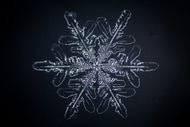Mt. Vesuvius eruption turned this victim's brain into a real-life Mr. Glass

In a rare discovery of ancient proportions, a research team headed by anthropologist Dr. Pier Paolo Petrone of the University Federico II of Naples and Piero Pucci of the CEINGE – Advanced Biotechnology of Naples has unearthed glassy vitrified brain remains from a victim of the cataclysmic 79 AD eruption of Mt. Vesuvius.
This epic disaster blanketed the Italian towns of Pompeii and Herculaneum with scorching hot ash-avalanches that instantly suffocated and killed all residents not yet evacuated to safety. The victim, whose brain was transformed into glass-like black fragments by the intense 950-degree heat, was first found buried in volcanic ash in a small chamber lying on a wooden bed back in the 1960s during the excavation of the College of the Augustales at Herculaneum.
According to researchers, he appeared to be a young adult male that archaeologists theorized was guardian for the College dedicated to the cult of Emperor Augustus. His actual remains are still visible at the Archaeological Site of Herculaneum, a seaside town near Naples at the foot of Mt. Vesuvius.
Nearly all cerebral tissues located in ancient human remains become saponified, a process whereby triglycerides convert to a soap-like substance of glycerol and fatty acid salts, making this discovery of heat-induced vitrification exceedingly rare.
In a new study published this week in the New England Journal of Medicine, Petrone and team examined the unrecognizable remains of this Vesuvius corpse and the charred skeletal remnants formed when its bodily fluids turned to high pressure steam and cause the body to burst.
By testing the timber found near the victim, they calculated that the room probably reached a maximum temperature of 968 degrees. The intense oven would have vaporized soft tissues in the body cavity and wiped out every ounce of fat. In the aftermath of the devastating heat blast, the corpse would have quickly cooled, leaving behind the skull pieces coated in glazed bits of brain.
Within the shattered skull fragments, scientist saw these twisted shards of glassy black material scattered among the remains of the cranial cavity. Co-author Piero Pucci of the Centro di Ingegneria Genetica-Biotecnologie Avanzate in Naples transported the brain tissue chunks back to the lab. There he and colleagues analyzed its specific proteins to confirm that this poor soul's brain had indeed been converted to glass-like material indicated by markers in fatty acids from human hair and brain.
Archaeological Site of Herculaneum director Francesco Sirano made this research process possible due to his long-lasting relationship and collaboration with Dr. Petrone, who had previously led a team examining skeletal remains of over 300 in Herculaneum that fled to beachside boathouses during the tragic Vesuvius eruption.

































